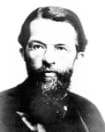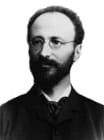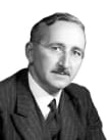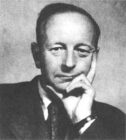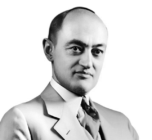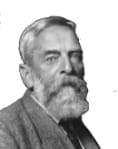Alexander Mahr
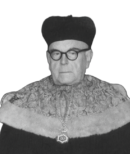
It is also a grave mistake to believe that the social sciences must apply analog methods in the same way as physics. This view fails to recognize the unique nature of the problems addressed in the social sciences.
TAKE AWAY
Born in 1896 near Znaim (Znojmo, CZ) Alexander Mahr studied with F. von Wieser at the University of Vienna and received his doctorate in 1925. A Rockefeller scholarship allowed him to continue his studies in the UK and US during 1926 and 1928. From 1930 and 1937 he was assistant to Hans Mayer (1879-1955), the successor to v. Wieser’s chair. Mahr did not attend L.v. Mises’ famous ‘Private-Seminar’, but belonged to that prolific 4th generation of the school, which added some of the most decisive works in Austrian Economics. Although most of its member had to leave before 1938, Mahr remained in Vienna and came to terms with the Nazi regime. Between 1938 and the end of WWII, he served as economist for the Central Office of Statistics. Among his many important contributions, Monetary Stability (1933) and especially his textbook Volkswirtschaftslehre (1948/ 2nd ed. 1959), which, after years of Nazi censorship, offered an inclusive presentation of economic theory from an Austrian perspective must be mentioned. His reentering academia after WWII proved somewhat problematic. Mahr died on April 14, 1972 in Vienna.
Kurt L. Leube
I
Alexander Mahr was born on January 31, 1896 in Poppitz, a small settlement near the town of Znaim (today Znojmo, CZ) in the winemaking region of the former Crownland of Moravia. In the early years of the 20 th Century his family moved to Vienna, where Mahr attended Gymnasium, joined the army and began to study Scandinavian philology, German studies and philosophy after WWI. In 1920, Mahr was luckily awarded a modest stipend that allowed him to study at the University of Gothenburg (S), but returned to Vienna to complete his Ph.D. in late 1921. Stimulated by Eugen von Philippovich’s (1858-1917) hugely popular textbook Grundriss der politischen Ökonomie (1899/1909/…), but mostly due to the strong and lasting influence of his mentor Friedrich von Wieser (1851-1926), Mahr began studying economics in Vienna and received there his doctorate in economics in 1925. Due to his brilliant mind, he received a prestigious Rockefeller scholarships for postgraduate studies in economics that made it possible for Mahr to spend the academic years 1926 to 1928 first at Harvard University (USA) and later in London (UK). Although Mahr considered himself part of the 4th generation of the Austrian School, according to F.A. von Hayek, he neither participated in Ludwig von Mises’s famous private seminar, nor did he attend meetings of the so-called Geistkreis, which was founded by F.A. von Hayek and his close friend Herbert J. von Fuerth (1899-1995) in 1921 as an informal discussion circle.
Several months after F.v. Wieser’s death in July of 1926, his talented student Hans Mayer (1879-1955) was appointed to Menger’s chair of the economics department at Vienna’s university and assumed the sponsorship and supervision of Mahr’s habilitation process. Influenced by his new mentor, Mahr’s thesis on “Investigations into the Theory of Interest” was a critical, but at times not fully convincing examination of Eugen von Böhm-Bawerk’s theories. Upon the publication of his thesis, Mahr was promoted to assistant professor in 1929. However, mention must be made here that Hans Mayer’s appointment to the powerful chair soon proved rather problematic as he engaged in a vendetta like conflict against Ludwig von Mises (1881-1973), Otmar Spann (1878-1950) and Carl Gruenberg (1861-1940). While von Mises represented the Boehm-Bawerk tradition of the Austrian School, the Austro-Marxist Gruenberg taught economic history and the anti-liberal universalist Spann lectured on political economics. Mayer but ruined the department and drove many promising students away from the university.
Having worked with Mayer for almost 10 years, not least for internal reasons Mahr left the university and began to work as a scientific consultant in the Central Statistical Office of Nazi occupied Austria. He played there a key role in the preparation of the politically important National Accounts for the regime and remained in this position until the end of WWII. Infrequently he also lectured in Graz on political economics.
After WWII, Mahr’s tenure at the Nazi dominated Central Statistical Office and his party membership proved problematic for him. Initiated by the four Allied Occupation Forces, the rigorous Denazification Process in Austria was aimed at removing Nazi ideology from the Austrian society, prosecuting war criminals, and imposing asset forfeitures and/or occupational bans of former party members. Consequently Mahr’s venia legendi (the privilege to lecture at a university) was revoked by the newly formed Austrian government in the fall of 1945. As the Denazification Process slowed significantly and ended with general amnesties in 1948/1949, Mahr finally was permitted to resume his lectureship at the University of Vienna.
With seed-money from the Rockefeller Foundation, but mainly financed by the Austrian entrepreneur Julius Meinl III Hayek was able to organize a reunion of former members of the 3 rd and 4 th generations of the Austrian School at the Meinl premises in Vienna in July 1948. In addition to Mises, Haberler, Hayek, Morgenstern, Machlup, Engel-Janosi e.a. also Mahr and Ewald Schams (1889-1955) participated and presented papers.
Against some political opposition, in 1952 Mahr was promoted to assume Carl Menger’s venerable chair of economics. He enjoyed this honor until his retirement in 1967. The academic years of 1953 and 1954, Mahr spent researching at the University of Cambridge (UK) and at Harvard in Cambridge (MA/USA). And in 1956 he was appointed Chairman of the National Economic Society in Vienna and elected Vice President of the Austrian Institute of Economic Research, the research institute, which L.v.Mises and F.A.v. Hayek had founded in 1927.
II
Together with Schoenfeld-Illy, Schams and Mayer, Alexander Mahr must be considered the last classical representatives of the Austrian School of Economics who continued teaching in Vienna after WWII. Despite the prevailing Zeitgeist of Keynesianism during the early 1950s, certain censorship attempts by the Occupation Forces and his general openness to competing views, Mahr preserved the marginal utility school as an independent field of research and adhered to the principles of the Austrian methodology and tenets. His textbook ‘Volkswirtschaftslehre’ (1948/2 nd ed. 1959), which after more than a decade of strict Nazi censorship offered an inclusive presentation of economic theory from an Austrian perspective, was a leading text in economics during the 1950s and 1960s and made the most important results of his own research easily accessible to students of economics while avoiding any pedagogical bias.
His studies on monetary theory (i.e. Monetary Stability, 1933), as well as numerous economic-policy essays confirm Mahr as a true successor particularly to the work of his mentors, Friedrich von Wieser and later Hans Mayer. However, some of Mahr’s articles on trade and economic policy are to a small degree already conceived in more macroeconomic terms and thus are somewhat aggregately oriented. Particularly noteworthy here is Mahr’s critical study of the ‘multiplier effect’ as a core of Lord Keynes’ arguments. According to Keynes fiscal policy measures could be used to stimulate economic growth during downturns, because an initial change in spending (like government spending or any investment) causes a larger, multiplied change in national income or GDP. In other words, the initial money spent turns into income for others, who then spend a portion of it, creating further income for more people in a continuous cycle. Thus for Keynes the size of the multiplier is determined by the fraction of income that people spend, i.e. the so-called marginal propensity to consume. Mahr rejected the multiplier effect on grounds that Keynes not only ignored the complexities of markets. He also distorted the true cause of economic fluctuations. Instead of viewing government spending as a reliable method for stimulating aggregate demand, Mahr emphasized the decisive role of individual decision-making, the structure of capital and also the signal function of the price system in markets.
The essence of Mahr’s extensive work can be found in his Collected Essays on Economic Theory, Berlin 1967, which contains some 60 scholarly and easily accessible essays. Although his several attempts to reenter academia after WWII proved somewhat problematic, Mahr received numerous awards, including full membership at the Austrian Academy of Sciences in 1963, in 1966 the Austrian Cross of Honor for Science and Art, First Class, and in 1971 the Gold Medal of Honor of the City of Vienna. In 1966 Mahr he was honored with a Festschrift on “Unity and Diversity in the Social Sciences”. On the occasion of the 100th anniversary of the Austrian School of Economics, Mahr was among the six representatives of the school honored in Vienna in June 1971. With F.A. von Hayek, Gottfried von Haberler, Fritz Machlup or Ludwig Lachmann in attendance, this celebration deservedly featured Mahr as holder of Menger’s chair. After having shaped the minds of countless students during the 1950s and the 1960s (regretfully, though, only for a minority long-lasting), Mahr died on April 14, 1972, in Vienna.

